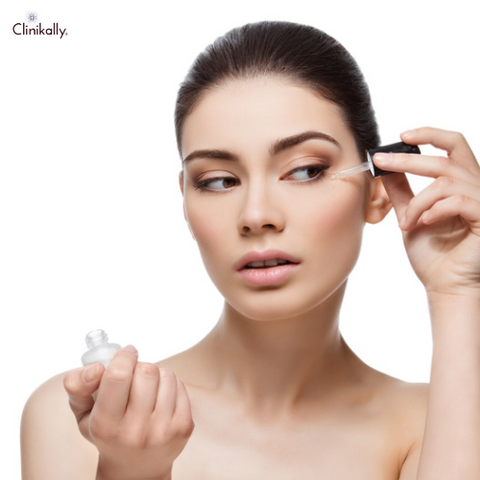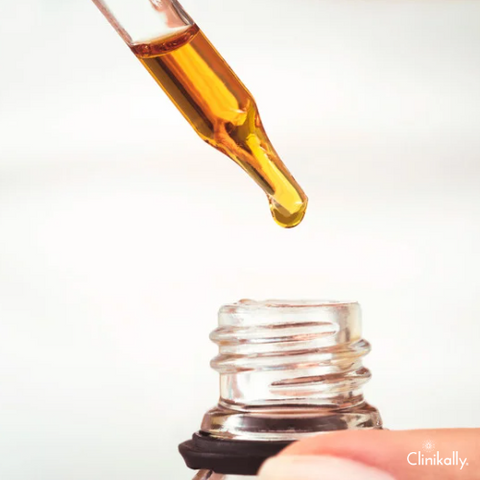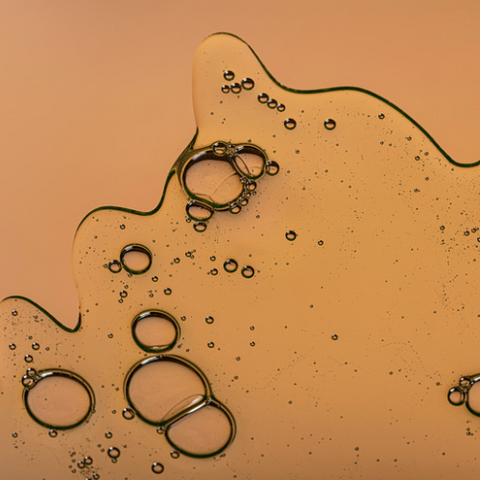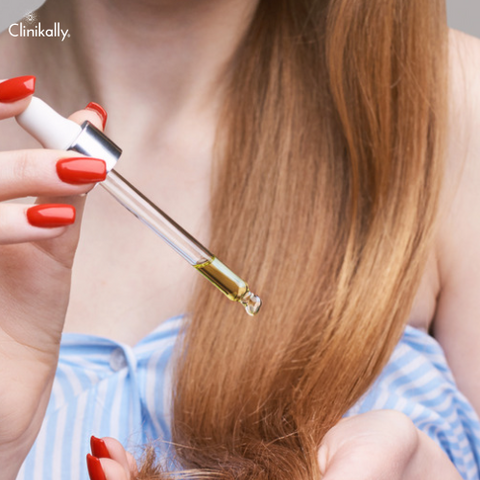Any skincare regimen must include serums because they help deliver active ingredients deep within the skin. However, knowing when a serum is no longer effective is critical so that you can make necessary changes to your skincare routine. No visible improvement, skin irritation, changes in skin texture, breakouts, and the expiration date are all signs that your serum is no longer working. It's critical to monitor how your skin reacts to serums and make adjustments as needed. If you notice any of these symptoms, it may be time to switch to a different product or seek advice from a dermatologist.
Identifying Signs Your Serum Isn't Effective

Serums are a wonderful addition to any skincare regimen, but it's critical to understand when your serum isn't performing as intended. Here are some signs to look out for:
-
No visible improvement: If you have been using your serum for a few weeks or even months and haven't noticed any visible improvement in your skin, it's time to reconsider whether the serum is right for you. If you're using a serum to address a specific issue, such as dark spots or fine lines, but you're not seeing any results, it's time to switch to a different serum.
-
Skin irritation: Your serum may not be appropriate for your skin type or contain ingredients that your skin is sensitive to if it causes red, itchy, or irritated skin after use. Find a serum that is designed for your skin type or experiment with a softer serum.
-
Skin texture changes: Your serum might not be working if your skin doesn't feel any smoother or more hydrated after using it. The serum might be too heavy for your skin type if your skin feels greasy or oily after using it.
-
Breakouts: Your serum may contain ingredients that are clogging your pores or are inappropriate for your skin type if it is causing breakouts. It might be time to try a different serum or seek advice from a dermatologist if breakouts worsen after using a serum.
-
Date of expiration: Serums have a shelf life, so if you've been using one for a while and haven't noticed any improvements, it's possible that the serum has gone bad. If the serum has passed its expiration date, check the label and replace it.
Lack of Visible Improvements
If you have been using a serum for several weeks or even months and haven't noticed any visible improvement in your skin, it's time to reconsider whether the serum is right for you. Here are some possible explanations for why you aren't seeing any progress:
-
Wrong serum for your skin type or concern: Not all serums are created equal, and each serum may be designed to address a specific skin concern or skin type. If you use a serum that is not tailored to your skin type or concern, it may be ineffective in meeting your needs.
-
Insufficient concentration of active ingredients: A serum may contain active ingredients that are known to improve skin texture and appearance, such as vitamin C or hyaluronic acid. The concentration of these ingredients, however, must be just right for them to be effective in bringing about noticeable improvements.
-
Incompatibility with other skincare products: Some skincare products might not mix well, so using a serum that is incompatible with your other skincare products may lessen the serum's effectiveness.
-
Underlying health problems: Sometimes, the absence of skin improvement can be attributed to underlying health problems. It might be difficult to see noticeable improvements even when using a serum if you have a skin disorder like eczema or psoriasis.
-
External factors: The skin's appearance can also be impacted by external factors like pollution, stress, and a poor diet. It might be difficult to see visible skin improvement if you are not caring for your general health and well-being.
Increased Skin Sensitivity
If you notice increased skin sensitivity after using a serum, it could mean that the serum isn't right for you or that you're using it incorrectly. Here are some of the possible causes of increased skin sensitivity:
-
Ingredients in the serum: Retinoids and alpha-hydroxy acids are examples of active ingredients that can irritate or aggravate some people. It's critical to review the serum's ingredients list before using it if you have sensitive skin.
-
Overuse: Using serum excessively or too frequently can cause skin sensitivity and irritation. It's crucial to use the serum only as advised and to adhere to the directions on the product label.
-
Interaction with other skincare products: When used together, some skincare products may not work well and may irritate or irritate sensitive skin. It's important to check whether the serum is compatible with your other skincare products.
-
Allergic reaction: In some cases, increased skin sensitivity may be due to an allergic reaction to the serum or one of its ingredients. Consult a dermatologist right away and stop using the serum if you experience redness, itching, or swelling.
Changes in Serum Consistency or Smell
A serum that has changed in consistency or smell could be an expired product or one that has been exposed to environmental factors that could have degraded its quality. Here are some possible reasons why a serum's consistency or smell may change:
-
Serum that has passed its expiration date: Like the majority of skincare products, serums have a finite shelf life after which they may no longer be useful or safe to use. Your serum may take on an odd odor, texture, or color if it is past its expiration date.
-
Heat or sunlight exposure: Heat or sunlight exposure can cause the serum's active ingredients to disintegrate and lose their potency. The serum's texture or smell may also change as a result of this.
-
Contamination: The serum may take on an odd smell or texture if it has been exposed to bacteria or other contaminants. This may occur if the serum is kept in an unclean environment or if you apply the serum with your fingers.
-
Changes in the formulation: Occasionally, adjustments to the product's formulation may be the cause of variations in the serum's texture or aroma. To increase a product's efficacy or to comply with new laws, manufacturers may change the formula.
Factors That Can Affect Serum Performance

The performance of a serum can be impacted by a number of factors, such as:
-
Skin type: Different serums are needed for various skin types. People with dry skin, for instance, might benefit from serums containing hyaluronic acid or glycerin, while those with oily skin might prefer light serums containing salicylic acid or niacinamide.
-
Skin issues: Specific skin issues, such as fine lines and wrinkles, hyperpigmentation, or acne, are addressed by serums. If you're using a serum that isn't made for your skin issue, it might not be able to meet your needs.
-
The concentration of active ingredients: A serum's performance may be impacted by the concentration of its active ingredients. A serum with a higher concentration of active ingredients might result in skin changes that are more obvious. The risk of skin sensitivity or irritation can, however, rise with higher concentrations.
-
Ingredient quality: The effectiveness of a serum may also be influenced by the quality of its components. The appearance and texture of the skin can potentially be improved more effectively with high-quality ingredients.
-
Use frequency: The use frequency of serum can have an impact on its effectiveness. Overuse or underuse of serum may not produce the desired results. It's important to follow the instructions on the product label and use the serum as recommended.
-
Other skincare products: Using certain skin care products and serums together may lessen the effectiveness of the serum because they may not work well together. It's important to check whether the serum is compatible with your other skincare products.
-
Lifestyle factors: Lifestyle factors such as stress, diet, and sleep can also affect the skin's appearance and texture. It's important to take care of your overall health and well-being to see visible improvements in your skin.
Serum Expiration and Shelf Life
Serums, like most skincare products, have a limited shelf life, so check the expiration date before using the product. The shelf life of a serum varies depending on the product's ingredients and formulation, but most serums have a shelf life of 6 to 12 months. Exposure to heat, light, and air, as well as contamination from bacteria or other contaminants, can all shorten the shelf life of a serum. When not in use, serums should be stored in a cool, dry place away from direct sunlight, with the bottle tightly sealed. Check the product label or packaging for the expiration date of a serum. Some serums have a "best before" date, while others have an expiration date. If the serum has expired, it may no longer be effective or safe to use, so discard it and replace it with a new one.
Incompatibility with Other Skincare Products
It's important to choose skincare products that work well together because using them together can reduce the performance of serums. When different skincare products contain ingredients that do not mix well or have different pH levels, incompatibility may result. For instance, some serums contain vitamin C, which is susceptible to instability and degradation when in contact with substances like retinol or benzoyl peroxide. Using these ingredients together may reduce the serum's effectiveness or cause skin irritation. Similarly, some exfoliants, such as alpha or beta hydroxy acids, can lower the pH of the skin, and using them in conjunction with a serum with a high pH may reduce the serum's effectiveness. Verify the ingredients of your skincare products to make sure they are compatible with one another to prevent compatibility issues. You can also get help from a dermatologist or other skincare expert in choosing items that work well together and meet your individual skincare requirements.
Skincare Needs and Lifestyle Changes
Several factors, including lifestyle changes, can influence your skincare requirements. Stress, sleep, diet, and exercise can all have an impact on your skin and the effectiveness of your skincare products, including serums. For instance, stress can cause hormonal imbalances and inflammation, which can result in breakouts and other skin issues. Sleep deprivation can also impair the skin's ability to repair itself, resulting in dullness and fine lines. A diet high in processed foods and sugar, on the other hand, can cause inflammation and lead to acne, whereas a diet high in antioxidants and healthy fats can help improve skin health.
The effectiveness of skincare products like serums can be increased through regular exercise, which increases the flow of oxygen and blood to the skin. Excessive sweating, on the other hand, can cause breakouts, so it's critical to wash your face after a workout to remove sweat and bacteria. Climate and environmental factors can also have an impact on your skin's requirements. Dry and cold weather, for example, can cause skin dryness and irritation, whereas hot and humid weather can cause excess oil production and breakouts.
What to Do When Your Serum Isn't Working

There are a few steps you can take to address the problem if you've been using a serum regularly and have noticed that it's not working as well as it once did:
-
Reassess your skincare routine: It's critical to assess your entire skincare regimen for any changes that may have impacted the effectiveness of your serum. Are you using any new products that may be interfering with the performance of your serum? Are you undergoing any lifestyle changes that may be affecting the health of your skin, such as stress or a lack of sleep? Examine your entire routine to see if there are any changes you can make to improve the health of your skin.
-
Check the expiration date: Make sure that your serum hasn't expired. The majority of skincare products have an expiration date, and using one after that can irritate your skin and lessen its effectiveness. If your serum has expired, it's time to replace it with a fresh one.
-
Try a different application technique: Occasionally, the way a serum is applied can affect how it works. Try using your serum at night if you've been applying it in the morning. Alternately, try applying the serum using a different method, like rolling it into the skin with your fingertips or using a facial roller.
-
Change to a new serum: If you've followed all the instructions above without experiencing any improvement, it might be time to try a new serum that more effectively addresses your current skin issues.
-
Consult a skincare expert: If you're still having trouble seeing results from your serum, you might want to talk to a dermatologist or other skincare expert. The best products and treatments for your particular skin concerns can be suggested by them, and they can assist you in identifying any underlying skin problems.
Evaluating the Serum's Ingredients
Examining the serum's ingredients is a crucial first step when analysing a serum that doesn't seem to be working. Here are some things to consider:
-
Active ingredients: Examine the active ingredients in your serum and learn about their benefits for your skin problem. If you're looking for a serum to target fine lines and wrinkles, ingredients like retinol or peptides can help. If you have acne-prone skin, look for ingredients such as salicylic acid or benzoyl peroxide. Make sure the active ingredients in your serum are well-suited for your skin type and concerns.
-
Concentration: Examine the serum's active ingredient concentration. The higher the concentration of active ingredients, in general, the more effective the serum. High concentrations, on the other hand, can increase the risk of skin irritation. Make sure the active ingredient concentration in your serum is appropriate for your skin type and concerns.
-
pH level: The pH of serum can also have an effect on its effectiveness. Most serums perform best when their pH ranges between 4.5 and 5.5, which is close to the skin's natural pH. If the pH of the serum is too high or too low, it may be ineffective.
-
Other ingredients: Examine the serum's other ingredients, such as preservatives, fragrances, and fillers. Check for any ingredients that could cause irritation or other negative reactions.
-
Compatibility with other products: Consider how the serum will interact with the other products in your skincare routine. Some ingredients can have negative interactions with other products, reducing their effectiveness. If you use multiple skincare products, make sure they all work well together.
Considering Alternative Serums
If you have evaluated your serum's ingredients, tried different application methods, and changed your skincare routine but are still not seeing results, it's time to look into alternative serums. Here are some things to consider when looking into new serums:
-
Look for serums that target your specific skin concerns: Consider the particular issues you have, such as fine lines, dark spots, or dehydration, and search for serums that are designed to address those problems.
-
Look over the ingredients: Examine the list of ingredients to make sure the new serum contains powerful active ingredients that are suitable for your skin type and concerns.
-
Keep the serum's texture in mind: A serum's texture can affect its efficacy. A lighter serum might be more useful if you have oily skin, while a richer serum might be better for dry skin.
-
Read reviews: Before purchasing a new serum, read reviews from other users to see if it has worked for others with similar skin concerns.
-
Give it time: It's important to give a new serum time to work before discontinuing use. Be persistent and patient with your use of serums as they typically take several weeks to produce results.
-
Don't be afraid to consult a skin care professional: If you're unsure which serum is right for you or need help with selecting new products, consider consulting with a skincare professional who can recommend products based on your specific skin concerns and needs.
Adjusting Your Skincare Routine
It might be time to change your skincare regimen if you've evaluated your serum, tried various application techniques, and looked into alternative serums but still aren't seeing results. Here are some steps you can take:
-
Simplify your routine: When it comes to skincare, sometimes less is more. It may be challenging to identify the specific product that is the problem if you use too many different ones. Think about streamlining your routine by getting rid of any extraneous items and concentrating on the necessities, such as a mild cleanser, moisturizer, and sunscreen.
-
Add a new product: If your routine has been simplified but you aren't seeing results, think about introducing a new product that addresses your particular skin issue. For instance, if you have dry skin, adding a hydrating serum or moisturizer may be beneficial.
-
Change the order of your routine: The order in which you apply your skincare products can impact their effectiveness. Make sure you apply your products in the proper sequence, beginning with the lightest and finishing with the heaviest.
-
Change how often you use the product: Some skincare products should be used daily, while others should only be used occasionally. Make sure you're using each product at the appropriate frequency for your skin type and concerns.
-
Consider using different products for different times of day: The requirements for your skin change depending on the time of day. To meet these various needs, think about using different products during the day and at night.
-
Don't forget about lifestyle factors: Diet, exercise, and stress are all lifestyle factors that can affect how your skin looks. If you want to see if changing these things will make your skin look better, do so.
Tips for Maximizing Your Serum's Effectiveness

The following advice will help you increase the efficacy of your serum:
-
Apply serum to damp skin: After cleansing your face, apply your serum while your skin is still damp. This will enable the serum to absorb more deeply into your skin and help to lock in moisture.
-
Use the right amount: Use the recommended amount of serum, of course. Using too little or too much can both be ineffective and irritable.
-
Apply serum correctly: Do not pull or tug on your skin when applying serum; instead, use gentle upward motions. Apply the serum liberally all over your face, including your neck and décolletage.
-
Layer products correctly: Make sure you're using the right order when applying your products, beginning with the lightest consistency and working your way up to heavier ones.
-
Use sunscreen: Sun damage has the potential to reverse any skincare regiment improvements you've made, so it's critical to protect your skin with a broad-spectrum sunscreen that has an SPF of at least 30.
-
Maintain skin hydration: Maintaining skin hydration is essential to maximizing the serum's efficacy. To keep your skin hydrated, make sure to consume plenty of water and apply moisturizer.
-
Use additional products to enhance your serum: Take into account utilizing additional products to enhance your serum, such as a hydrating mask or a facial oil. This could improve the serum's advantages.
-
Keep using it: Most serums take some time to start working, so be patient and diligent in your application. After a few weeks, if you're still not seeing results, think about changing your routine or experimenting with a different serum.
Proper Serum Storage and Handling
Serum storage and handling must be done correctly to ensure that the serum remains effective and safe for use. Here are some suggestions for storing and handling serum:
-
Store in a cool, dry place: Keep your serum out of the sun and heat and in a cool, dry location. Your serum's ingredients may deteriorate and lose some of their effectiveness when exposed to heat and light.
-
Keep the cap firmly closed: When not in use, make sure to keep the serum cap firmly closed. The ingredients may also deteriorate if they are exposed to air.
-
Avoid contamination: Always wash your hands before handling your serum to avoid transferring bacteria onto the product. To prevent contamination when using a dropper, keep it away from your skin and other surfaces.
-
Check expiration date: Be sure to check the expiration date of your serum and discard it if it has expired. It may be ineffective or even harmful to your skin to use a serum that has expired.
-
Observe manufacturer's instructions: When handling and storing your serum, abide by the manufacturer's instructions. While some serums may have specific handling instructions, others might need to be refrigerated.
-
Don't share your serum: To reduce the chance of passing bacteria or other contaminants to others, don't share your serum.
By following these guidelines, you can help to extend the life and effectiveness of your serum.
Ensuring Optimal Absorption
To ensure optimal absorption of your serum, follow these tips:
-
After toning and cleansing, apply your serum to clean, dry skin. This aids in clearing away any dirt or debris that might prevent your serum from being absorbed.
-
Use the recommended amount of serum because going overboard can irritate the skin and going underboard might not work.
-
The serum should be massaged into your skin using gentle circular motions. This encourages the serum to penetrate the skin further and helps to increase blood flow.
-
After using your serum, wait a few minutes before using moisturizer or sunscreen or any other skincare products. This enables the serum to penetrate your skin completely.
-
When it comes to skincare, consistency is crucial. To get the best results, use your serum frequently—ideally once or twice a day.
-
After applying your serum, you can increase absorption and maximize its effects by using a facial roller or gua sha tool.
-
To ensure that your neck and décolletage benefit from your serum as well, apply it to those areas as well.
Integrating Serums with Your Skincare Regimen
Serums are a fantastic way to address particular skin issues and enhance the general health and appearance of your skin. The following advice will help you incorporate serums into your skincare routine:
-
Identify your skin concerns: Determine your skin issues, such as dryness, dryness, fine lines, wrinkles, or dark spots. Select a serum that specifically addresses these issues.
-
Layer your products correctly: Apply your serum after cleansing and toning, and before moisturizing. If you use several serums, apply them starting with the thinnest and working your way up to the thickest in order of thickness.
-
Apply a moisturizer next: After using your serum, apply a moisturizer to seal in moisture and give your skin more hydration.
-
Use consistently: When it comes to skincare, consistency is important. To get the best results, use your serum frequently—ideally once or twice a day.
-
Be patient: It takes time for skincare products to produce results. Don't expect overnight results, but stick with your skincare routine consistently and you will begin to see improvements over time.
-
Don't forget about sunscreen: Some serums, such as those containing vitamin C, can make your skin more sensitive to the sun. Be sure to apply sunscreen daily to protect your skin.
Recognizing When to Make Changes
An essential component of taking control of your skincare journey is realizing when to change your skincare regimen. Here are some indicators that you might need to change:
-
Lack of results: It might be time to try a different serum if you've been using one consistently for a few weeks or months and haven't noticed any improvement in your skin problems.
-
Skin irritation: A serum may not be suitable for your skin type or contain ingredients that irritate your skin if you experience redness, itching, or other symptoms of irritation after using it.
-
Lifestyle changes: Your skin can be impacted by alterations to your diet, stress levels, or environment, so it's critical to review your skincare regimen and make any necessary adjustments.
-
Age-related changes: Your skin's requirements may alter as you get older. You might need ingredients that target fine lines and wrinkles or more hydration, for instance.
-
New skin issues: You may need to modify your skincare routine to address any new skin issues you may have, such as acne or hyperpigmentation.
Achieving Your Skin Goals with the Right Serum
Finding a serum that targets your specific skin issues, selecting it, and adhering to recommended serum usage and storage procedures are all necessary to achieve your skin goals. The following advice will help you choose the ideal serum for your skin goals:
-
Choose the aspect of your skin that you want to improve, such as dryness, fine lines, wrinkles, or dark spots.
-
Select a serum that contains active ingredients that address your skin problems specifically. For instance, look for a serum that contains retinol or peptides if you want to minimize the appearance of fine lines.
-
Choose a serum that is appropriate for your skin type by taking into account whether you have oily, dry, combination, or sensitive skin.
-
Look for reputable companies that make use of premium ingredients and have a proven track record of creating serums that work.
-
Consult a dermatologist or aesthetician for advice on the best serum for your skin goals and concerns if you're unsure which one to choose.
You can achieve your desired skin goals and enjoy healthy, radiant skin by choosing the appropriate serum and adhering to best practices for serum usage and storage. Keep in mind that skincare is a journey, and you may need to be patient and dedicated to see results, but you can achieve the gorgeous, healthy skin you deserve with commitment and consistency.
Conclusion: Taking Charge of Your Skincare Journey

Being aware of your skin concerns, understanding the benefits and limitations of the skincare products you use, and making informed decisions to optimize your skincare regimen is all part of taking charge of your skincare journey. Serums are a great addition to any skincare regimen because they offer specialized benefits and can help with the treatment of particular skin issues. It's important to realize that not all serums are created equal and that their effectiveness can vary depending on the ingredients used, the way they are made, when they expire, and how they are stored. By monitoring the performance of your serum, modifying your skincare regimen as necessary, and adhering to best practices for serum usage and storage, you can maximize the advantages of your skincare products and achieve your desired skin goals. Remember that skincare is a journey, and it may take time and patience to see results, but you can achieve healthy, radiant skin with dedication and consistency.
































